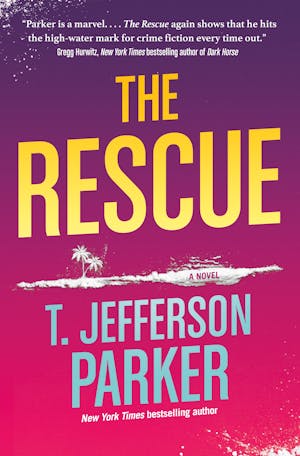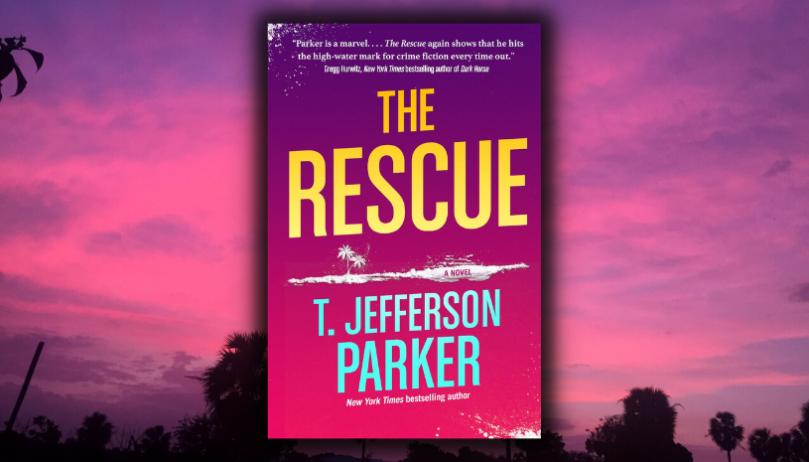 The Rescue is a gripping thriller that explores the strength of the human-animal bond and how far we will go to protect what we love by three-time Edgar Award winner and New York Times bestselling author T. Jefferson Parker.
The Rescue is a gripping thriller that explores the strength of the human-animal bond and how far we will go to protect what we love by three-time Edgar Award winner and New York Times bestselling author T. Jefferson Parker.
While reporting on a Tijuana animal shelter, journalist Bettina Blazak falls in love with one of her story’s subjects—an adorable Mexican street dog who is being treated for a mysterious gunshot wound. Bettina impulsively adopts the dog, who she names Felix after the veterinarian who saved him.
In investigating Felix’s past, Bettina discovers that his life is nothing like what she assumed. For one thing, he’s not a Mexican street dog at all. A former DEA drug-sniffing dog, Felix has led a very colorful, dangerous, and profitable life. With Bettina’s story going viral, some interesting people are looking for Felix, making him a target—again.
Bettina soon finds herself drawn into a deadly criminal underworld from which she and her beloved dog may not return.
The Rescue will be available on April 25th, 2023. Please enjoy the following excerpt!
CHAPTER ONE
Night in Tijuana, light rain from a pale sky.
Inside the Furniture Calderón factory and warehouse, the Roman follows his mongrel dog as it noses its way through the cluttered workstations, sniffing and snorting the chairs and sofas and barstools and bed sets in varying stages of completion.
The dog stands on its hind legs to smell the table saws and sewing machines, the measuring tapes and clamps and glue pots, then drops back to all fours again to sniff the fragrant bundles of hides and the colorful bolts of fabric piled high like treasures looted from a caravan. Between stops, it covers ground swiftly, nose up, nose down. Its short, four-count breaths draw the air both into its lungs and across the scent receptors packed within its muzzle.
The Roman is in black tactical couture all the way from his polished duty boots to the black ski mask snug to his face and head. Black socks, a loose black kerchief for that band of neck below the mask. The dog’s black leash is bunched in one hand. Behind the Roman are some of his business associates—four militarized soldiers of the Jalisco New Generation Cartel, and four men in humble street clothes instead of the khaki-with-green-trim uniforms of the Municipal Police, their official employer. They all carry late-model automatic weapons, some laser sighted and some with traditional iron sights.
Sullen and alert, these men trail the Roman and his dog, respectful of their sizable skills and reputation as a cash-and drug-detection team. The Roman has never told the men his real name, only his nom de guerre, the Roman. So to them, he is simply Román.
The dog’s name is Joe, and he looks more like a common street dog than a cash-and-drug-whiffing savant. Joe is a trim fifty-five pounds, short haired, long legged, and saber tailed, with rust ovals on a cream background. He is terrier-like and dainty footed, but his gull wing ears protrude from what could well be a Labrador retriever’s solid head. To these heavily armed men, accustomed to the burly German shepherd dogs, Malinois, and Rottweilers favored by the DEA and Federales— and the pit bulls adored by narcotraficantes—Joe looks amusing and almost cute. The Roman, on the other hand, is simply loco. But the Roman and his dog always find and deliver.
Joe’s snorts sound softly in the still, cavernous factory. His gently up-curved tail wags eagerly. He wheels and feints his way through the river of smells. Cuts right, then left, then right again, but moves forward, always forward. His ears bounce. He loves his job.
The Roman, through his ski mask, also smells the leather and the lumber and the faint dust-smoke of the incandescent lamps above. He marvels once again at Joe’s ability to experience these strong, obvious scents but also hundreds of others that he, a mere man, can’t smell at all. And not only does Joe gather exponentially more than any human, he instantly distinguishes these smells from the chosen few that are his purpose and his passion: fentanyl, heroin, cocaine, methamphetamine, marijuana, and currency.
And, of course, small animals.
Joe breaks toward a slouching stack of boxes, snatches a mouse off the floor, dashes it twice against the concrete—rap, rap—then looks proudly at his master.
Whispers and grunts and the metallic unslinging of guns.
“Joe, down, you sonofabitch.”
Then laughter.
Joe plops to his belly, head up, ears smoothed back in submission, staring at the Roman with eager penance. He doesn’t know what sonofabitch means, but he knows what the Roman’s tone of voice means.
“That’s one of the reasons they retired him,” the Roman says to no one in particular. His Spanish is good but accented by English. Learned in school, by the sound of it, not border Spanglish picked up on the job. “He’s got a lot of terrier in him, and some things he can’t control. Won’t control.”
“¡Un perro terrible!” says a policeman.
“¡Muy rápido!” says a cartel soldier.
“Come,” orders the Roman. Joe bolts to his side and sits, looking up hopefully. “Steady, Joe. Steady, boy. Let’s try this again. Okay, find!”
In the back of the vast warehouse, Joe alerts on a dented metal trash can overflowing with scraps of cloth and leather and wood.
He sits in front of his perceived find, as he has been trained. He looks first at the Roman, then at the trash can, but with a very different expression from his please-forgive-me-for-killing-the-mouse look. Now his ears are up and his eyes are fixed on the object of his alert. A quick glance at his master, then back to the business at hand. He’s trembling.
Two of the policemen quietly tip over the container while a third, on his knees, rakes out the trash.
“Ah . . . aha!” he says, pulling a green steel ammunition box from the mound of trash, then another, and another.
The Roman can smell the gasoline that the ammo boxes have been wiped down with—a standard dumb idea for confusing a dog. He’s seen hot sauce, cologne, mint-flavored mouthwash, cat urine, bleach, and antiperspirant used too. Most traffickers don’t know that dogs don’t smell the combined odors within a scent cone; they smell individual ones. They separate and register each component of the whole. A book of smells, each smell a word. So no matter how you try to disguise a scent, the dog is rarely fooled or repelled. The dog knows what’s there.
The Roman knows the only thing that works against a good narcoticsand-currency dog is perfect packaging, but Joe has the best nose the Roman has ever seen. The much surer solution would be to keep your stash far away from dogs like Joe, maybe on another continent. Or to bribe the dog’s handler, or the handler’s handler. Money solves most problems.
A squat cartel lieutenant whom the Roman knows only as Domingo kneels and pops the heavy latch on one of the steel cases. It’s a standard US Army–issue ammunition box—twelve by six inches and seven and a half inches high—and the former contents are stenciled in yellow on a lengthwise flank: 100 cal. 50 cartridges.
As the rain begins to pound the metal roof high above, Domingo removes an open package of fragrant naphthalene mothballs from inside the box, then six neat vacuum-packed bricks of US twenty-dollar bills. The Roman knows that the old-school Sinaloans from whom he is stealing weigh-count the bricks to exactly one-half pound, which means this case contains $28,800. And he knows that $9,600 of it will soon belong to him and Joe, who is watching all of this with shiny-eyed pride. From one of the many pockets on his pants, the Roman gives him a cube of steak.
The other two ammunition boxes contain identical treasures, for a gross total of $86,400 for the Jalisco New Generation Cartel and the participating Municipal Police officers who have helped make this possible.
And $28,800 for himself, the Roman, and for Joe, man’s best friend.
But the raindrops suddenly turn into footsteps, faint but fast.
The Roman and his little army dive for cover, machine guns chattering away at them. Domingo, closest to the loot, goes down with a cry and a wobble of blood.
The Roman calls Joe but the dog has vanished in the horrific noise. The compadres return fire, their bullets clunking home or twanging in ricochet. The Roman knows he’s in a numbers game, and the noise actually sounds encouraging: four shooters, six? But this is the Sinaloans’ warehouse and they know it better than he and his men do.
“Joe, come! Joe, come!”
The Roman draws his sidearm, a .40-caliber Glock 35 with a laser sight that holds twenty-two rounds and will not jam. He calls Joe again but the dog is gone. The gunfire subsides while footsteps land in the smoky silence. The Roman runs from his cover toward the rear exit of the warehouse. Then a volley and a high-pitched yipe from Joe. The Roman strides straight toward that yipe, shoots down a slender sicario in a white cowboy hat and a Shakira T-shirt, turns and center-shoots another man, twice—boom, boom—the bullets slamming into the far wall before his body plops to the floor. The Roman is a big man; he knows he might take a bullet someday doing shit like this. But he loves it.
You wear the crown, you wear the target.
Joe whimpers to his left and the Roman charges the sound, zigzagging down a long aisle lined with mile-high shelves like a big-box store, and the Roman senses the enemy behind him, turns, and blows him down with three shots, the sicario’s machine gun clattering to the concrete
The Roman and his employers press the running battle toward the rear exit and the loading docks and the street. The Sinaloans are fewer, just as the Roman had thought. They’re running hard for the steel sliding door through which they entered; it is still cracked open. Two escape, but the Roman and his confederates cut down two others as they try to squeeze out.
Followed by Joe, who clambers over the bodies and limps crookedly through the door and into the night.
“Joe, come! Come!”
Outside, the Roman scans the dark barrio with his pistol raised, trying to watch the cars and the houses and the buildings and the street, trying to keep from getting shot, trying to see his wounded dog. The Sinaloans have apparently taken off. Two boys run down Coahuila Street, oversized athletic shoes splashing potholes filled with rain. Sirens wail and citizens stoically observe the Roman from behind windows and cracked doors. They’ve seen this before—their city among the most violent cities in a violent country in a violent world.
The Roman calls out to them in anguished Spanish: “Where is my dog? Where is my dog?”
No one answers.
“Joe! Here, boy! Come!”
The Roman searches the sidewalks and beneath cars, under the festive furniture on the porches and the tiny front yards, even the gutters running black and throwing up wakes over pale sandbags that just maybe could be Joe.
The sirens force him away.
He’s the last to pile into the white-and-green van parked on a side street. It’s the one with the Ciudad de Tijuana Policía Municipal emblems on the sides and the orange light on the top and the three green cartridge cases on the floor beside the badly wounded Domingo. The driver runs the wet city streets fast, no warning light and no siren. Just the high beams. And the stink of blood and fear and gun smoke, and the pounding of the Roman’s heart.
Five minutes later the van pulls into Superior Automobile Repair and Service, and the motorized wrought iron gate with the big sign on it rolls closed behind them. The compound is surrounded by an impregnable ten-foot concrete wall with broken bottles cemented to the top. A man in street clothes waves the driver in to the high bay and the repair stations inside.
Domingo has died, so the others climb over him and out. The Roman is first among them, carrying one of the three ammunition cases, his pay for the night’s work. He loves the feel of $28,880 in his hand, but his heart aches with the loss of Joe.
Another man in street clothes walks the Roman to his car.
“It is terrible what happened, Señor Román.”
The Roman has rehearsed a lifetime for what just happened. Which prepared him poorly for it. He’s killed three men just now. His first, not counting war. He feels gutted and surprised.
“Fuck off, Amador.”
The Roman’s car is a green Maserati Quattroporte parked over a platform jack in one of the repair stations, as if to be worked on first thing in the morning. The Roman sets the ammo case in the trunk and tosses the ski mask beside it. Runs his hands through his short blond hair.
Behind the wheel now, he nods to the man, who throws a toggle on a cabled control box. The platform jack shudders and lowers the Maserati into the ground. The Roman looks at himself briefly in the rearview as the darkness claims him, blame and anger in his bloodshot gray eyes. Blame and anger. He thinks: Joe. I’d go back and look for him if la colonia wasn’t crawling with cops, some on cartel payrolls but some not.
Five minutes and a slow mile through the dark underground tunnel later, the green Maserati rises from its grave, safe within the high spiked walls of Platinum Foreign Car Specialists in Otay Mesa, California.
The Roman waits as the gate swings open, then drives through it into the California night.
Click below to pre-order your copy of The Rescue, coming April 25th, 2023!













Comments are closed.
Leave a Reply